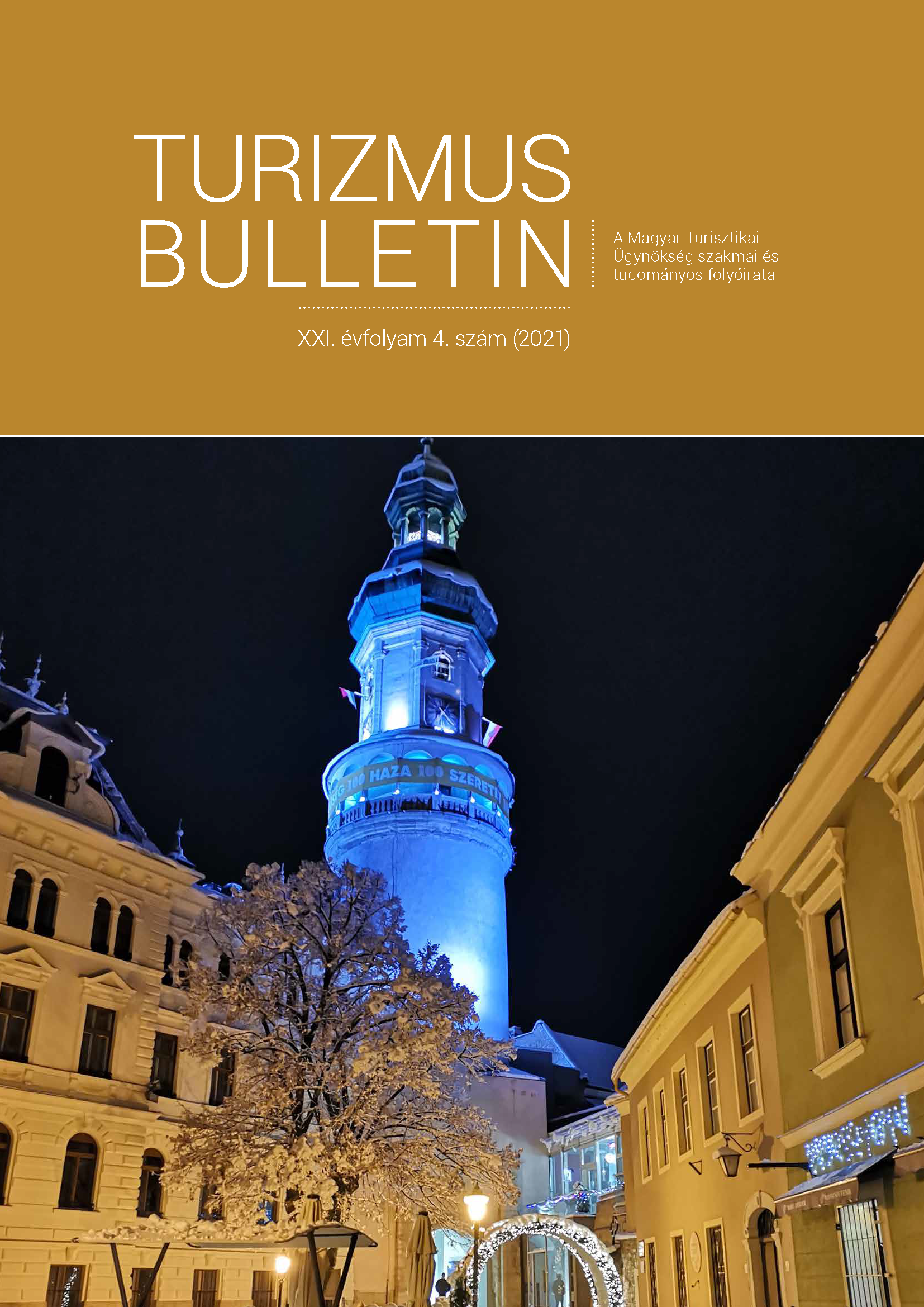Party time? – What makes Budapest District VII attractive for domestic consumers?
DOI:
https://doi.org/10.14267/TURBULL.2021v21n4.5Keywords:
overtourism, experience, genius loci, party district, repositioningAbstract
The party tourism and overtourism phenomena characteristic of Budapest, District VII, prior to the Covid19 pandemic, in early 2020, fell silent almost overnight. The relaunch raises a number of questions regarding “how to continue”. The starting-point of the present study is the theoretical overview of overtourism and the experience, as well as the genius loci that can be interpreted as a possible factor of the latter. Our research question focuses on what makes Budapest District VII for leisure consumers and for domestic travelers, segmented by generations, attractive? To answer our question, we used narrative analysis to help us gain a deeper understanding of the experience that consumers find memorable and identify the genius loci of the district. Based on the narratives, District VII has historical, cultural, artistic and social values that make it possible to identify a genius loci that is specifically linked to the area and makes it unique to all generations of consumers.
References
AHO, S. (2001): Towards a general theory of touristic experiences: Modelling experience process in tourism. Tourism Review. 56(3–4). pp. 33–37. https://doi.org/10.1108/eb058368
APOLLO, M. – RETTINGER, R. (2019): Mountaineering in Cuba: Improvement of true accessibility as an opportunity for regional development of communities outside the tourism enclaves. Current Issues of Tourism. 22(15). 1797–1804. https://doi.org/10.1080/13683500.2018.1446920
BINKHORST, E. – DEKKER, T. (2009): Agenda for Co-Creation Tourism Experience Research. Journal of Hospitality Marketing & Management. 18(2–3). pp. 311–327. https://doi.org/10.1080/19368620802594193
BUTLER, R. W. (1980): The concept of tourism area cycle of evolution: implications for management of resources. Canadian Geographer. 24(1). pp. 5–12. https://doi.org/10.1111/j.1541-0064.1980.tb00970.x
CARU, A. – COVA, B. (2007): Consumption Experience. Routledge, London.
CHRISTOU, P. A. – FARMAKI, A. – SAVERIADES, A. – SPANOU-TRIPINIOTI, E. (2019): The “genius loci” of places that experience intense tourism development. Tourism Management Perspectives. 30. 2019. pp. 19–32. https://doi.org/10.1016/j.tmp.2019.01.002
DOXEY, G. V. (1975): A causation theory of visitor/resident irritants: Methodology and research inferences. Proceedings of the Travel Research Association 6th Annual Conference. pp. 195–198.
GARCIA, D. M. M. (2018): Dark Tourism: Understanding the factors that create memorable tourism experience in the case of Millenials. Budapesti Corvinus Egyetem, Budapest.
HORVÁTH D. – MITEV A. (2015): Alternatív kvalitatív kutatási kézikönyv. Alinea, Budapest.
KELEMEN-ERDŐS A. – MITEV A. (2020): Eszképizmustól az ajánlásig – Élményfokozatok és hatásai a romkocsmákban. Turizmus Bulletin. 20(2). pp. 14–21. https://doi.org/10.14267/TURBULL.2020v20n2.2
KIM, J. – RITCHIE, J. – McCORMICK, B. (2012): Development of a Scale to Measure Memorable Tourism Experiences. Journal of Travel Research. 51(1). pp. 12–25. https://doi.org/10.1177/0047287510385467
KOENS, K. – POSTMA, A. – PAPP, B. (2018): Is Overtourism Overused? Understanding the Impact of Tourism in a City Context. Sustainability. 10(1)2. 4384. https://doi.org/10.3390/su10124384
KRUCZEK, Z. (2019): Ways to Counteract the Negative Effects of Overtourism at Tourist Attractions and Destinations. Annales Universitatis Mariae Curie-Sk odowska Seria B. 74. 2019. pp. 45–57. DOI: 10.17951/b.2019.74.45-57.
KULCSÁR N. (2015): A fogyasztói érték és az élmény kontextusa a turisztikai szakirodalomban. Vezetéstudomány. 46(3). pp. 18–25. https://doi.org/10.14267/veztud.2015.03.02
LENGYEL A. (2019): A mindfulness és liminalitás felértékelődése: spirituális elvonulási központok, a fenntartható jövő desztinációi? Turizmus Bulletin. 19(1). pp. 14–24.
MICHALKÓ G. – IRIMIÁS A. (2011): Csalódásmenedzsment a turizmusban: új szemlélet a turisztikai célterületek irányításában. Marketing & Menedzsment. 45(2). pp. 4–10.
MICHALKÓ G. – RÁTZ T. (2005): A kulturális turizmus élmény-gazdaságtani szempontjai. In: Enyedi Gy. – Keresztély K. (szerk.): A magyar városok kulturális gazdasága. Magyarország az ezredfordulón. Stratégiai ta¬nulmányok a Magyar Tudományos Akadémián. MTA Társadalomkutató Központ, Budapest. pp. 123–141.
MITEV A. – KELEMEN-ERDŐS A. (2017): Romkocsma mint bricolage: Élményközpontú szolgáltatásérték-teremtés a romkocsmákban. Turizmus Bulletin. 17(1-2). pp. 26–34.
SMITH, M. K. – PINKE-SZIVA, I. – OLT, G. (2019): Overtourism and Resident Resistance in Budapest. Tourism Planning & Development. 16(4). pp. 376–392. https://doi.org/10.1080/21568316.2019.1595705
PINE, B. J. – GILMORE, J. H. (1998): Welcome to the Experience Economy. Harvard Business Review. 76(4). pp. 96–105.
PINKE-SZIVA, I. – SMITH, M. – OLT, G. – BEREZVAI, Z. (2019): Overtourism and the night-time economy: a case study of Budapest. International Journal of Tourism Cities. 5(1). pp. 1–16. https://doi.org/10.1108/ijtc-04-2018-0028
PINKE-SZIVA I. – KENESEI ZS. – KISS K. – KOLOS K. – KOVÁCS E. – MICHALKÓ G. (2020): Társadalmi innováció a városi desztinációk versenyképességének szolgálatában. Fókuszban az éjszakai gazdaság hatásainak menedzselése. Vezetéstudomány. 51(7–8). pp. 2–12. https://doi.org/10.14267/VEZTUD.2020.07-08.01
PIZAM, A. – MILMAN, A. (1986): The Social Impacts of Tourism. Tourism Recreation Research. 11(1). pp. 29–33.
SZABÓ K. – HÁMORI B. (2006): Információgazdaság. Digitális kapitalizmus vagy új gazdasági rendszer? Akadémiai Kiadó, Budapest.
UNWTO (2018): Overtourism? Understanding and managing urban tourism growth beyond perceptions. Madrid. pp. 1–12. https://doi.org/10.18111/9789284419999
VECCO, M. (2020): Genius loci as a meta-concept. Journal of Cultural Heritage. 41(1). pp. 225–231. https://doi.org/10.1016/j.culher.2019.07.001
ZÁTORI A. (2014): A turisztikai élményteremtés vizsgálata szolgáltatói szemszögből. Doktori (PhD) értekezés. Budapesti Corvinus Egyetem, Budapest. https://doi.org/10.14267/phd.2014055
ZÁTORI, A. – SMITH, M. K. – PUCZKÓ, L. (2018): Experience-involvement, memorability and authenticity: The service provider’s effect on tourist experience. Tourism Management. 67. (August, 2018) pp. 111–126. https://doi.org/10.1016/j.tourman.2017.12.013
ZEMLA, M. (2020): Reasons and Consequences of Overtourism in Contemporary Cities – Knowledge Gaps and Future Research. Sustainability. 12(5). 1729. https://doi.org/10.3390/su12051729
Internetes források
PINKE-SZIVA I. (2021): A bulinegyed után is van élet: így alakulhat át Budapest a túlturizmus és a nullturizmus sokkja után. https://forbes.hu/uzlet/budapest-korona-turizmus-bulinegyed/, Letöltve: 2021. március 26.

